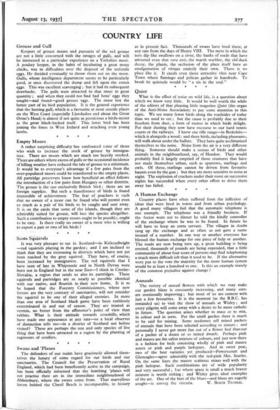Quiet
What is the effect of noise on wild life, is a question about which we know very little. It would be well worth the while of the editors of that pleasing little magazine Quiet (the organ of the Anti-Noise Association) to pay some attention to this topic. We see many fewer birds along the roadsides of today than we used to see ; but the cause is probably due to their freedom from dust, a form of matter in which birds delight. For their dusting they now have recourse to our hard tennis courts or the railways. I know one rifle range—in Berkshire— which is alongside a wood; and there birds, including pheasants, will walk about under the bullets. They have quite acclimatised themselves to the noise. Noise from the air is a very different thing. Someone should make a census of birds and other animals in the neighbourhood, say, of Hendon. They would probably find it largely emptied of those creatures that have not made themselves urban, such as sparrows, starlings and owls. Of these, starlings cannot be driven from favourite haunts even by the gun ; but they are more sensitive to noise at night. The explosion of crackers under their roost on successive nights has succeeded when every other effort to drive thorn away has failed.






































 Previous page
Previous page